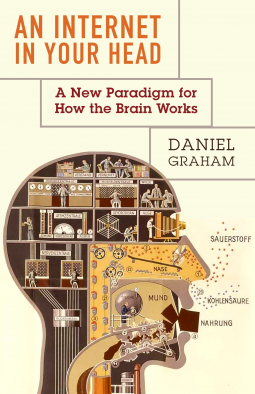Please wait... This may take a moment.
An Internet in Your Head
A New Paradigm for How the Brain Works
This title was previously available on NetGalley and is now archived.
Pub Date
May 04 2021
| Archive Date
Aug 11 2021
Description
Whether we realize it or not, we think of our brains as computers. In neuroscience, the metaphor of the brain as a computer has defined the field for much of the modern era. But as neuroscientists increasingly reevaluate their assumptions about how brains work, we need a new metaphor to help us ask better questions.
The computational neuroscientist Daniel Graham offers an innovative paradigm for understanding the brain. He argues that the brain is not like a single computer—it is a communication system, like the internet. Both are networks whose power comes from their flexibility and reliability. The brain and the internet both must route signals throughout their systems, requiring protocols to direct messages from just about any point to any other. But we do not yet understand how the brain manages the dynamic flow of information across its entire network. The internet metaphor can help neuroscience unravel the brain’s routing mechanisms by focusing attention on shared design principles and communication strategies that emerge from parallel challenges. Highlighting similarities between brain connectivity and the architecture of the internet can open new avenues of research and help unlock the brain’s deepest secrets.
An Internet in Your Head presents a clear-eyed and engaging tour of brain science as it stands today and where the new paradigm might take it next. It offers anyone with an interest in brains a transformative new way to conceptualize what goes on inside our heads.
Whether we realize it or not, we think of our brains as computers. In neuroscience, the metaphor of the brain as a computer has defined the field for much of the modern era. But as neuroscientists...
Description
Whether we realize it or not, we think of our brains as computers. In neuroscience, the metaphor of the brain as a computer has defined the field for much of the modern era. But as neuroscientists increasingly reevaluate their assumptions about how brains work, we need a new metaphor to help us ask better questions.
The computational neuroscientist Daniel Graham offers an innovative paradigm for understanding the brain. He argues that the brain is not like a single computer—it is a communication system, like the internet. Both are networks whose power comes from their flexibility and reliability. The brain and the internet both must route signals throughout their systems, requiring protocols to direct messages from just about any point to any other. But we do not yet understand how the brain manages the dynamic flow of information across its entire network. The internet metaphor can help neuroscience unravel the brain’s routing mechanisms by focusing attention on shared design principles and communication strategies that emerge from parallel challenges. Highlighting similarities between brain connectivity and the architecture of the internet can open new avenues of research and help unlock the brain’s deepest secrets.
An Internet in Your Head presents a clear-eyed and engaging tour of brain science as it stands today and where the new paradigm might take it next. It offers anyone with an interest in brains a transformative new way to conceptualize what goes on inside our heads.
Advance Praise
"Graham offers a fresh, insightful, and informative perspective on brain function, proposing that communication between neurons resembles signal passing in the internet as a novel metaphor to investigate the brain. He provides erudite discussions and presents compelling arguments in a lively and clear manner.
"
--Gabriel Kreiman, Harvard Medical School
"Graham offers a fresh, insightful, and informative perspective on brain function, proposing that communication between neurons resembles signal passing in the internet as a novel metaphor to...
Advance Praise
"Graham offers a fresh, insightful, and informative perspective on brain function, proposing that communication between neurons resembles signal passing in the internet as a novel metaphor to investigate the brain. He provides erudite discussions and presents compelling arguments in a lively and clear manner.
"
--Gabriel Kreiman, Harvard Medical School
Available Editions
| EDITION |
Other Format |
| ISBN |
9780231196048 |
| PRICE |
$140.00 (USD)
|
Additional Information
Available Editions
| EDITION |
Other Format |
| ISBN |
9780231196048 |
| PRICE |
$140.00 (USD)
|
Average rating from 3 members
Featured Reviews
 Reviewer 688009
Reviewer 688009
4 stars
4 stars
4 stars
4 stars
4 stars
An Internet In Your Head is a wonderful book that gave many good insights on the internet and its relationship to the meat in our head, would recommend everyone to give this a shot.
4 stars
4 stars
4 stars
4 stars
4 stars
Readers who liked this book also liked:






